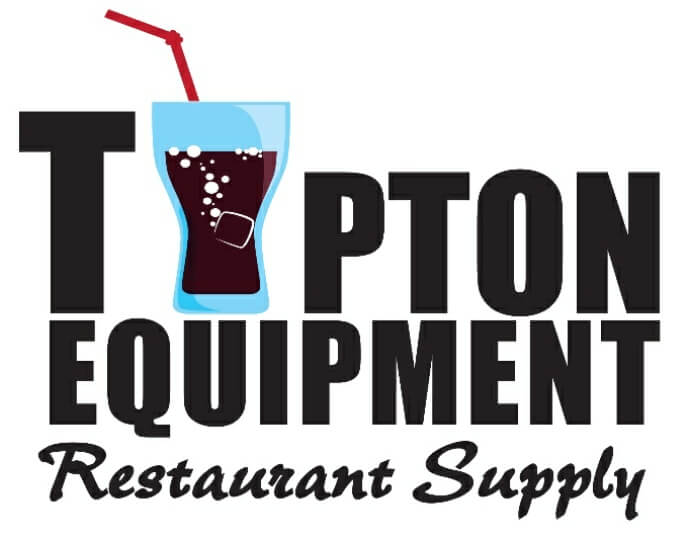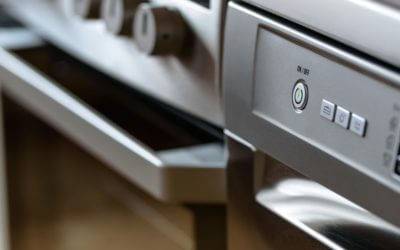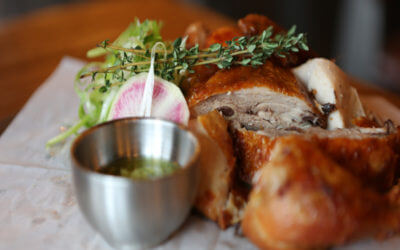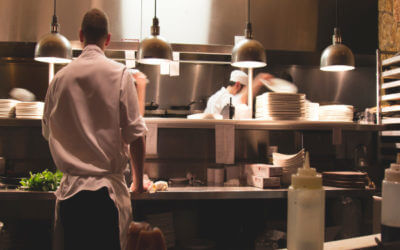5 Ways to Get the Most out of Your Dishwasher
July 8, 2017Dishwashers are an incredibly helpful timesaver, and in the fast-paced restaurant industry, staff and managers are desperate for even a small amount of extra time. Although simply putting dishes into a machine seems simple, if your dishwasher is not well-maintained and breaks down unexpectedly, you will be stuck washing dishes by hand until you get your dishwasher fixed.
Gladly, dishwashers are easy to maintain. The easiest and most effective way to ensure your machine continues to do its job smoothly is to do a few simple maintenance steps with every load. Pay attention to these 5 tips that will help you keep your dishwasher at top performance.
1. Scrape and rinse your dishes first. While many dishwasher manufacturers say you don’t need to fully rinse your dishes before putting them into a machine, too many food scraps can clog the pump assembly, drain lines or spray arms, and this can result in a build-up of bacteria.
It can also stop the dishwasher from cleaning your dishes properly. The more food residue you remove from your dishes before putting them in the dishwasher, the longer you will put off any unneeded repairs.
2. Run the hot water. Before starting your dishwasher, run some hot water. Doing this ensures your dishwasher will use hot water for its first cycle. This is especially important in the winter, as it takes more time for water to get hot.
3. Don’t use too much detergent. It’s a common mistake to think that the detergent cup in your dishwasher should always be completely full. Most detergents are concentrated enough that you only need to fill the cup halfway or even one-third full. Overusing detergent can not only leave an ugly film of residue, but can also etch your glasses.
4. Clean your dishwasher with vinegar. Place a container filled with a cup of white vinegar on the top rack of your dishwasher, keeping the rest of the machine empty. Run the machine through its hot water cycle. Once the cycle is done, you will notice that it has removed the grease, grime and musty odors from the machine.
5. Choose the right dishwasher: Dishwashers are a wonderful asset only when you buy the right one. You will likely have this dishwasher for a while, so choose wisely. Here are a few things to keep in mind in order to choose the best dishwasher for your restaurant.
Size matters. How much space is available in your kitchen? Will you have to move other appliances to make room for your new dishwasher? Will there be room for other appliances you plan to purchase in the future?
Save energy. Choose an energy-efficient model to reduce your restaurant’s energy bill and your ecological footprint.
Consider the features. Modern dishwashers have many different wash programs, and some are specialized for a certain type of dish ware. Ensure the model you choose will be up to the demands of your particular restaurant.
What’s in a Cooking Pot, How to Choose the Right One?
As a restaurant owner, your cooking needs might vary. Did you know that a good quality pot can greatly improve your cooking experience, while also improving the quality of your cooking? This cooking equipment is a very important one that cannot be done away with...
5 Things Every Restaurant Owner Should Do Before Buying Used Kitchen Equipment
Equipping your restaurant properly can cost a lot of money, so buying used kitchen equipment is the go-to choice for many restaurateurs. Buying used kitchen equipment for a restaurant is a bit different than buying used equipment for your home, however. You will...
Top Restaurant Technology Trends in 2018
When looking to buy restaurant supplies, you want to be on the leading edge of technology trends. This will keep your kitchen running smoothly. Let’s take a look at some of the most recent trends in restaurant supplies technology. 1. New Payment Options Who would...
5 Different Ice Shapes and Why You Should Care About Them
Ice makers are very popular in the restaurant and foodservice community because they eliminate the need to buy ice every day. And of course, adding an ice maker to your collection of foodservice equipment means you will always have ice on hand when you need it. An...
Pulping and Grinding: A Starter’s Guide to Reducing Commercial Food Waste Costs
For most restaurant owners and managers, the expenses involved in making meals are always under careful consideration. Water is needed to prepare, cook and wash food; power is necessary for food prep, cooking and cooling, and so on. However, how many of us consider...
Choosing the Right Milk Cooler: Cold Wall or Forced Air?
In a restaurant, milk is an essential to have on hand for coffee and other café-style beverages, for serving with kids’ meals, and as a key ingredient in many recipes. Keeping your milk properly chilled can be difficult without the proper restaurant equipment....
How to Choose Your Next Commercial Meat Smoker
The movies that connect with us on a personal level are the ones that linger in our memories forever. Anyone who has used a commercial meat smoker knows that they have a huge influence on the taste of a meal. You need to have just the right kitchen equipment to get a...
Are High Speed Ovens Too Good to be True?
You might have heard a few of the bold claims that foodservice equipment manufacturers have been making about high speed ovens, but they can’t be possible, right? Cooking three times as faster as regular ovens? Five times as fast? Fifteen times as fast? It may seem...
Choosing the Right Food Storage Containers for Your Restaurant
Choosing the right kitchen supplies will make a difference in your restaurant. Whether it is heavy duty kitchen equipment or food storage containers, each piece of equipment plays its own important role. Today, we are going to talk about how to choose the right food...
Tipton’s Guide to Perfect Poultry Trussing
Do you ever truss birds in your commercial kitchen? Trussing is a fantastic cooking technique because it makes poultry cook faster, look more attractive and taste better. If your commercial kitchen prepares poultry, you don’t want to miss these trussing tips. Trussing...
How to Eliminate Excess Condensation in Your Kitchen
Is your commercial kitchen getting steamy? If so, you could have more than just an uncomfortable working environment on your hands. Excess moisture in your commercial kitchen can result in the corrosion of equipment, the development of mold, and even damage to your...
The DIY Guide to Your Restaurant’s Own Garden
Stocking your restaurant supply with your own home-grown herbs and produce can truly bring your dishes to life. When it comes to food, everyone knows there’s nothing like homemade and home-grown. Having your own culinary garden, however large or small, can help you...
5 Reasons a Meat Grinder Will Set Your Burgers Apart
The more you do to prepare your foods in-house with the right kitchen equipment, the fresher and more flavorful your dishes become. There are all sorts of restaurants offering fast-food style burgers, but some diners are looking for the real deal. A fresh, juicy...
Pest Preventions to Implement in Your Commercial Kitchen
Restaurant pests: it’s something that few people want to think about. Like it or not, pest management is an essential consideration for every commercial kitchen. Offering food, shelter and water, the unprepared commercial kitchen naturally provides everything pests...
Choosing the Right Material for Your Cooking Equipment
Kitchens are very unique to their chef. Just like a car mechanic has a toolbox unique to them, so is the cooking equipment in a kitchen. And over time, the same cooking equipment become a natural extension of the chef. What tools are you using in your kitchen? It...















